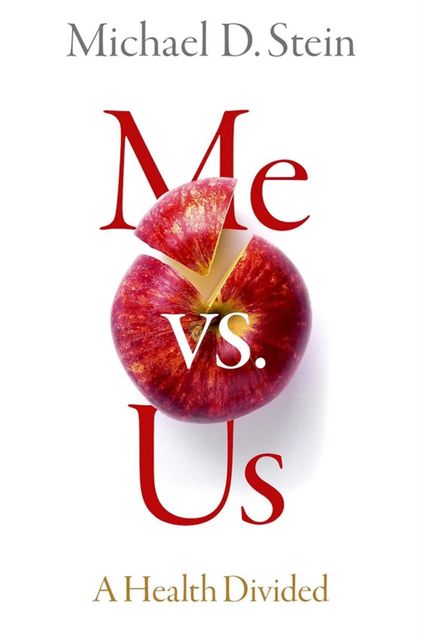SPH Professor Examines Nation’s Healthcare Woes
In his new book, Me vs. Us: A Health Divided, Michael Stein examines this question: why do we care so much about health care, yet so little about public health? Stein, a Boston University School of Public Health professor of health law, policy, and management and department chair, and a primary care physician, shows how over history, public health has repeatedly been overshadowed by individual medicine, which has led to less public health funding, fewer resources for issues like obesity and climate change, and misguided priorities. This excerpt from Me vs. Us (Oxford University Press, 2022) is published with the author’s permission.
Filmmakers understand the distinction between individuals and groups. When they shoot a character in a coma or receiving a bone marrow transplant, they know the viewer is thinking: she could be me. When they sweep across the debris of a village where an earthquake has killed thousands, they know the viewer, thinking on a different scale, may be moved and disturbed, but without any route for self-identification, will be less riveted. For filmmakers, our collective reality is most comprehensible through individual life stories rather than large groups.
Similarly, our interest in health care, the medical care of individuals, supersedes our interest in public health, the well-being of collections of people. Medical care concerns itself with identifiable persons, whereas public health takes up statistical or anonymized lives, many lives seen through an extreme wide shot. Let me offer two scenarios that demonstrate these two divergent perspectives.
Scenario 1: You are the doctor seeing James, a 25-year-old man who rides a motorcycle and who has come to your medical office for a routine annual physical. At the end of his visit, you must make the choice between discussing organ donation or not bringing up the subject at all. Which would you do with James?
When imagining yourself as the doctor in this scenario, I believe that you would choose not to discuss donation. You would avoid this troubling issue because to bring it up is to move the conversation perhaps outside James’ personal concern—he merely wanted the rash on his hand checked and a flu vaccine—and to turn what might have been a perfectly smooth and upbeat medical visit into an awkward occasion that includes an imagined and fatal accident.
Scenario 2: Now approach the same question of organ donation imagining yourself as a regular, non–health care–employed citizen who lives in James’ hometown. Young men who ride motorcycles are sometimes seen in medical offices for routine annual physicals. At such visits, the choice must be made between discussing organ donation or not bringing up the subject at all. What do you think doctors should do in these situations?
I believe that you would recommend that doctors, as a group, should discuss donation with these young men.
The first scenario introduces a medical question: How do I care for this patient? The second introduces a public health question: What should we want for our town? Medical doctors deal with one motorcyclist at a time, whereas public health-ers consider aggregates of young motorcycle drivers. If you gave discrepant answers (I wouldn’t discuss donation in scenario 1, but every medical provider should discuss donation in scenario 2), it suggests that looking at a problem from different perspectives can change your judgment. The way you would treat the unique patient in front of you differs from the way you view a group of comparable patients. The physician is trained to be the perfect agent for each and every motorcycle rider. The public health practitioner, trying to come up with a policy, is trained to imagine herself as the protector of society, and considers a single patient as simply part of a collection of motorcycle riders. Discrepant answers suggest there is a conflict between these two perspectives.
We might admit that the public health perspective has a generous (though poignant) prospect—his donated organs could imaginably save the lives of others in his hometown if James has a fatal accident—but still, most of us would not insist that doctors and motorcycle-owning patients have this difficult conversation. We might agree with the group perspective and the public health interest in creating the largest possible base of transplantable organs, but we understand it is difficult to oblige doctors to follow in practice. And so, we would be hesitant to create and enforce a policy penalizing doctors if they did not discuss organ donation with motorcycle riders. Based on my informal surveys, persons who give discrepant answers to my two scenarios feel far more strongly about their “no” to the question in scenario 1 than about their “yes” to the question in scenario 2. We prefer and defer to the medical perspective; we naturally assume it.
Our fears about health have always been cleaved: Each of us worries about him- or herself (the Me perspective of medical health) and we worry about others (the Us perspective of public health). And yet, what is best for the individual may not be feasible for the group, and vice versa. Medical care and public health thus represent distinct dispositions and attitudes, competing views of health.

Comments & Discussion
Boston University moderates comments to facilitate an informed, substantive, civil conversation. Abusive, profane, self-promotional, misleading, incoherent or off-topic comments will be rejected. Moderators are staffed during regular business hours (EST) and can only accept comments written in English. Statistics or facts must include a citation or a link to the citation.